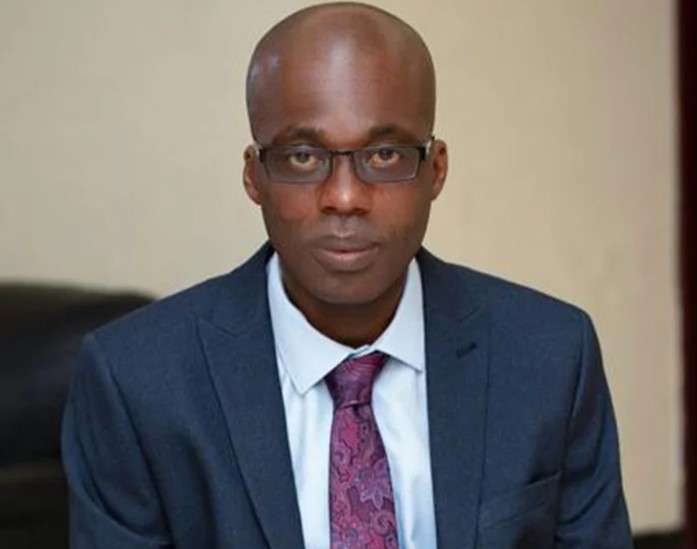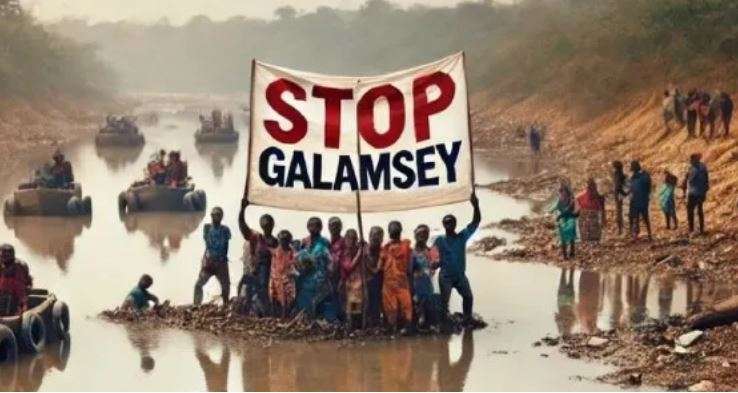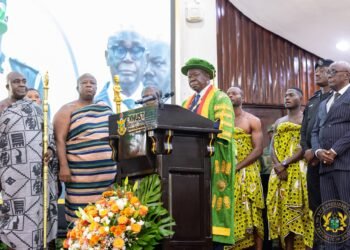From the 21st to the 23rd of September 2024, some Ghanaians took to the streets in a three-day protest organised by Democracy Hub, expressing their frustration over the government’s failure to tackle the escalating menace of illegal mining, popularly known as galamsey.
The protest highlighted the public’s discontent with political leaders, whose inaction has allowed galamsey to devastate the country’s forests and water bodies.
While the demonstrators sought to draw attention to the environmental destruction, the government’s response—particularly the heavy security presence—raised more questions than answers.
Dr. Kwame Asiedu Sarpong, Democracy and Development Fellow at the Ghana Centre for Democratic Development (CDD-Ghana), in a scathing critique, criticized the methods employed by the protesters and the hypocritical reactions from segments of society who appear blind to their complicity in the environmental crisis.
Though Dr. Sarpong admitted that he does not fully endorse the protest methods used by Democracy Hub, he is even more critical of the sanctimonious outcry from public figures on social media who he called “enablers of the environmental terrorism we have chosen to call galamsey.”
These individuals, often projecting indignation, are quick to express anger and shock over the environmental crisis. However, Dr. Sarpong pointed out that their outrage is selective and misguided.
He posited that instead of holding the true perpetrators of galamsey accountable, they obfuscate the issue, distracting attention from the fact that much of the damage done to Ghana’s forests and rivers has been allowed by those in power—people they often protect or remain silent about.
“If they had any sense of shame they would first wonder how the state could marshal this level of security towards the Democracy Hub demonstrators but can’t do the same to drive the likes of Akonta Mining from our forests or those mining opening on rivers and by the roadside”.
Dr Kwame Asiedu Sarpong, D&D Fellow at the Centre for Democratic Development (CDD-Ghana)
Dr Sarpong’s statement captured the absurdity and double standards in the government’s approach to the galamsey problem, asserting that while peaceful protesters are met with overwhelming security forces, illegal mining operations that threaten Ghana’s environment continue unabated.
The contrast between these responses, Dr. Sarpong suggested, highlights the government’s misplaced priorities and lack of genuine commitment to protecting the nation’s natural resources.

Lack of Political Will: The Core of the Crisis
The heart of the matter, Dr. Sarpong explained, is not just incompetence, but a deliberate refusal by the government to act against galamsey operators.
He noted that the government’s inability to tackle the issue is rooted in its ties to the very individuals responsible for illegal mining.
He claimed that these powerful figures, who fund political campaigns, are shielded from accountability, allowing them to continue destroying forests and rivers with impunity.
“The government lacks the political will to protect citizens against existential threats by removing the people who fund their politics from our forests and river bodies”.
Dr Kwame Asiedu Sarpong, D&D Fellow at the Centre for Democratic Development (CDD-Ghana)
This observation, he noted exposes the uncomfortable truth that much of the environmental damage is politically motivated, with those in power unwilling to jeopardize their financial support by cracking down on illegal mining activities.
In his critique, Dr Sarpong called out those who have taken to social media to lambast the protestors rather than focus on the real issue.
He questioned the integrity of these individuals, calling their hypocrisy “comical” and urging them to take a hard look at themselves, adding that by diverting attention away from the culprits, they perpetuate the crisis instead of working towards a solution.
Where Is the Real Outrage?
Dr. Kwame Asiedu Sarpong juxtaposed the public reaction to the protest with the far more severe environmental destruction caused by galamsey.
He admitted that he did not like the videos circulating from the protests, but emphasised that “nothing in there came near the videos I have seen on galamsey.”
He strongly posited that the destruction of rivers like the Pra and Offin, the razing of forests, and the open mining on roadsides should spark far greater outrage than peaceful demonstrations aimed at raising awareness.
“Let the government show the same zeal I saw from the Ghana Police yesterday at Osino, Konogo, Samraboi, and on the Pra and Offin Rivers just to name a few”.
Dr Kwame Asiedu Sarpong, D&D Fellow at the Centre for Democratic Development (CDD-Ghana)
Rejecting Neutrality and the Call for Accountability
In his final remarks, Dr. Sarpong took an unequivocal stance: “I am not neutral and will never be. In fact, I detest neutrality as it fosters inaction”.
For him, neutrality in the face of galamsey is a moral failing that allows the problem to persist. His advocacy is based on the principle that the government must prioritize the safety and well-being of its citizens, which includes taking decisive action to protect the environment from destruction.
However, Dr. Sarpong was quick to distinguish between principled advocacy and partisanship. He made it clear that his criticism is not about political loyalty but about holding leaders accountable, regardless of their affiliation.
“What I am not, however, is a partisan who keeps quiet whilst the actions of his associates try to kill us off”, he stressed.
His statement underscores the need for all Ghanaians—regardless of their political leanings—to reject complicity and demand real action from the government on the fight against galamsey.
The destruction of Ghana’s environment is not a partisan issue, but an existential threat that requires collective effort to overcome.
The future of the country depends on the courage to act—decisively and without bias—to protect the environment and hold the true culprits accountable.
Anything less is not just an abdication of responsibility, but a complicity in the destruction of Ghana itself.
READ ALSO: The Impact of Technology on the Landscape of Copyright: Challenges, Opportunities























